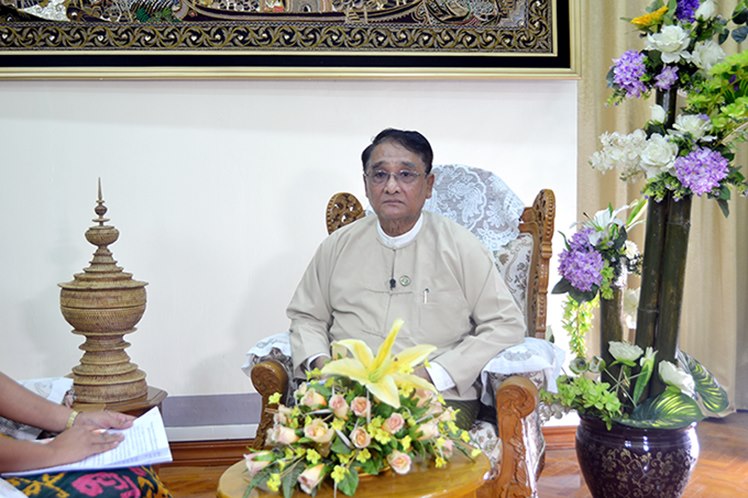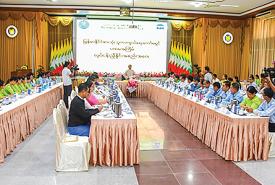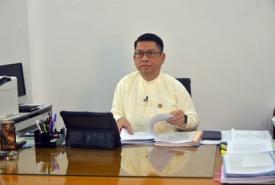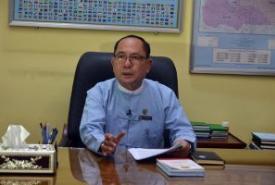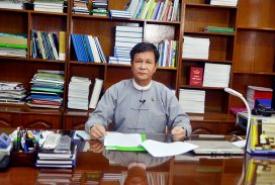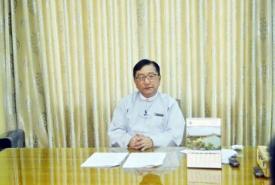2 May
With the expectation of developing the economy of the nation, the Ministry of Commerce is shouldering the trade sector
By Khin Yadanar and Zin Oo Photo Thiha Sithu
Concentrating on the development of the state economic sphere, including the private sector, the Ministry of Commerce (MoC) is doing business in top gear.
Minimizing the complex and difficult procedures of the past, the officers and staff members of the MoC are sailing along with the amended rules, regulations and laws in doing business. The journey of fourth year is being interviewed with the responsible persons including the Union Minister, and it is submitted to the esteemed readers and the people.
Dr. Than Myint (Union Minister)
Q: Please share with us the salient economic development of the ministry.
A: With the intent to support the economy of the nation, the MoC is doing business through trade. The Private Sector Development Committee (PSDC) is chaired by Vice President U Myint Swe and that the Union Minister is shouldering the position of Vice Chairman. Always keeping in touch with the private organizations and interacting with the media, the MoC is regularly reporting to the PSDC.
Vice President U Henry Van Thio is the Chairman of the Myanmar Special Economic Zones Central Committee (MSEZCC) and I am responsible as the Secretary. I took the chair of the Management Committee of the MSEZCC. The MoC involved in many trade development tasks including the implementation of Myanmar – China Special Economic Zones.
Q: Kindly explained over the minimizing of procedures in the MoC.
A: Priority is given for the export sector, and at the same time, the development of foreign investment is also put in the forefront, working in cooperation with the private sector. Many faceted tasks of affiliation and looping are carried out by the MoC for the development of private trade sector.
Since the previous laws and the procedures were outdated, they have been replaced with new laws and rules. Especially, enormous relaxation has been made in export permits application.
Introducing e-Commerce through the application of online system, many hurdles have been solved for the business people. Most interesting tasks of the sub-committee are termed as “Ease of Doing Business”, where cooperation is the main theme among the business people in the commerce sector, in making the functions more flexible.
Q: Please tell us the difficulties and challenges of the MoC.
A: As we have abundant natural resources and human resources, we could offer fine opportunity for trade and commerce. On the other hand, we have weakness in the infrastructure such as buildings, roads, and power supplies. We have to deal the challenges. The main export produce and items come from agricultural sector, and that the produce from animal breeding and fisheries are also in the line of export, followed by garment industry. In penetrating the international market, the export produce and items need to be in the top notch quality.
Narrow Market for Export
Weakness is found in our export products and also in the price competition, and that we need to pull down the production cost and trading cost. For instance, the production cost could be reduced, but on the other hand, the expenses in the trading process are high, posing challenges with the need of long term solution.
Export market is experiencing with narrow scope. We are exporting rice to sixty countries mainly in African continent; however, we have to rely on the neighbouring countries for the export of corn, variety of bean and pulses, and other items. When the trade policies of these countries changed, Myanmar faces difficulties in export trade.
Q: Tell us over the implementation with regard to law perspective.
A: On 15 March 2019, the Pyidaungsu Hluttaw passed Law No. 9/2019 on the new Consumer Protection Law 2019 to promote and protect the interest of consumers over all goods and services. Moreover, the Myanmar Consumer Protection Commission (MCPC) was also formed. It has created an atmosphere of fair completion in the market.
On 24 May 2019, the Myanmar Parliament passed the Copyright Law, marking the fourth and final intellectual property (“IP”) law in the country’s new IP regime.
On 30 January 2019, the Myanmar Parliament passed the Trademark Law and the Industrial Design Law. The Patent Law was passed on 11 March 2019. The law also establishes the Central Committee for Intellectual Property Rights.
When the trade law is enacted during this year, more relaxation of rules is expected in the commerce and trade sectors. The upcoming laws, by-laws, and procedures would be instrumental in the control mechanism among the business people.
For the advantage of SMEs, the legislation approved a new Safeguard Law on 24 December 2019. The legislation is drafting bills with regards to “Antidumping Law” and “Countervailing Law”. The laws aim to safeguard domestic manufacturers from cheap imports, and support demand for locally-made products.
Enactment of laws
The new Consumer Protection Law 2019 is to promote and protect the interest of consumers over all goods and services. It also serves interest to producers, the traders, and all people in commerce and trade.
Q: Please share us the messages from the MoC to be conveyed to the people.
A: There are products coming from agriculture sector and industrial sector, and that the traders buy and sell these products for consumption. The surplus is exported, and that the imported goods are being managed in the country. The enormous and varied tasks are to be shouldered by all stakeholders.
Trade exhibitions are being convened in the international arena as well as in domestic sphere in promoting the commerce and trade, and that are the result of cooperation of the business community, the people, and the government.
U Aung Htoo (Deputy Minister)
Q: Kindly share us the achievement of the fourth-year performances.
A: Aspiration and main task of the MoC is for the economic development of the country through the trade. During the tenure of the incumbent government, the export is to elevate to three fold. We have witnessed progress in the export of rice, corn and maize, and also bean and pulses. We could also export livestock animals.
Q: Tell us about the national export strategy.
A: With the assistance of the WTO, we have crafted the national export strategy. First based on 2015 – 2019 and expanded to 2020 – 2025 as we have gained momentum. The export included items from agriculture, industry and services of the ICT sectors.
Q: Tell us on the relaxation being made with regards to law.
A: We have enacted such as that of Consumer Protection Law; that of the Safeguard Law; and that of the IP Law. With these laws being activated in the country, more investment is expected in the country.
Q: Share us on the private sector development.
A: Vice President U Myint Swe is at the helm of the committee undertaking the development of the private sector, and that the difficulties and hurdles were being resolved during several meetings, through five working committees.
Q: Tell us more about “Ease of Doing Business”.
A: For the development of the private sector, the main task is to resolve the difficulties experiencing in the private sector. We are working in collaboration with the World Bank; however, we still have red tape system, tied up with corruption. In cleaning up the system, we have formed ten aid and assistance groups for the commerce sector.
All hands on deck are working for easing the deadlocks in the commerce sector, and that economic index stays at (177) without significant improvement.
Economic Indicators
Due to our efforts last year, we arrived at (165) slot, and that the improvement was seen at the establishments of companies and the allowances of permits in constructions. We are trying our best to reach the index at level (100) in the year’s ahead.
Q: Please tell us about the agriculture produce management group.
A: The group is being formed under the Law of Protection of the Farmer Rights and Enhancement of their Benefits. The government has fixed the floor price at MMK 500,000 for (100) baskets of paddy, in a move to protect the interests of paddy farmers. MMK (15) billions have been allowed from the revolving funds.
Ayeyawady, Bago and Yangon regions have seen that the market price of paddy went below the floor pricing, and therefore, MMK (6 point 5) billions have been spent, saving and salvaging the farmers. Such act of assistance has stabilized the paddy price above MMK 500,000, giving guarantee for the farmers.
Q: Tell us about special economic zones.
A: The MoC has been entrusted with the task for the establishment of special economic zones. Currently, we have set up Special Economic Zones in Thilawa, Kyaukphyu and Dawei. A Thilawa hosts (112) companies with MMK (1 point 9) billion, it is seen as most successful zone. Dawei Special Economic Zone is under implementation with the cooperation of Thailand and Japan, and that the Kyaukphyu Special Economic Zone is moving ahead with the cooperation of CITIC of the PR China.
Border Economic Cooperation Zone
A MoU was signed between Myanmar and China for the establishment of border economic zone while the State Counsellor visited PR China in 2017. Currently, the Border Economic Cooperation Zone is to be realized in the areas between Muse and Shweli.
Q: Kindly elaborate on the topic of job opportunities.
A: In working with the development partners, the MoC has negotiated options for the creation of job opportunities. Cooperation is ongoing with regard to the job creations in garment industry, the hotel and tourism industry, and the construction industry.
The employment in the garment industry has jumped from (400,000) workers to (600,000) workforce, where (95) per cent is women, thus providing advantage to them. During four years time, the CMP sector has multiplied to (10) times in its production value, reaching US$ (5) billions.
Q: Kindly share us messages intended for the people.
A: COVID -19 pandemic brings negative impact on border trade, and that we are trying to overcome the loss and damages. The tactic on trade approach has been shifted to broader perspective, and that (15) commercial counselors have been sent abroad to develop trade.
U Aung Soe (Permanent Secretary / Director- General of Myanma r Trade Development Team).
Q: Share us on the export promotion tasks.
A: Strategy for National Export has been laid down to elevate the export volume, prioritizing on rice, bean and pulses, oil crops, fisheries products , forest products, and garment items. Income from service of the tourist industry is also accounted.
A new building for the Myanmar Trade development was constructed in Nay Pyi Taw at the cost of MMK (600) millions. Plans are on the agenda for the establishment of two trade promotion centers at the costs on MMK (200) millions each in the Kayah State and the Rakhine State, in assisting the development of state / region governments.
Q: Tell us on the achievements of Myanma Trade Development Team.
A: Agricultural export and the application of e – commerce are on the agenda, and that the “Innovation and Entrepreneurship” would be prioritized. Export of fruits is on the brighter side, generating about US$ (400) millions. Intended export of Myanmar handicrafts is on the agenda.
Q: Kindly explain on the export oriented programs.
A: Establishment of “Information Network” is completed to get information for export drive. The “Trade Promotion Plan” created through the Commercial Counselors is very much instrumental.
U Myint Lwin (Director-General, Department of Consumer Affairs).
Q: What were the tasks in connection with the consumers’ protection?
A: On 15 March 2019, the Pyidaungsu Hluttaw passed Law No. 9/2019 on the new Consumer Protection Law 2019 (“CPL”) which repeals the previous Consumer Protection Law 2014. The intention of the passing of CPL is to promote and protect the interest of consumers over all goods and services.
Q: Tell us on the accomplished tasks with regards to consumers’ protection.
A: Awareness dissemination tasks have been carried out for the people covering (5 point 32) millions, which is (10) percent of the total population of the whole country.
Q: Kindly share us on the tasks for domestic trade development.
A: For the development of internal trade in private sector, relevant groups have been formed namely the fruits development groups; the fruit zone development groups; formation of a total of (893) associations and (1994) groups; a total of (43) zones and (65) wholesale markets.
U Min Min (Director-General, Department of Trade).
Q: Please share us on the development in the foreign trade sector.
A: Myanmar foreign trade stood at US$ (29) billions in 2016 – 2017, and it jumped to US$ (34) billions in 2017 – 2018. Next, 2018 – 2019 saw US$ (35) billions, witnessing yearly progressive increase.
Trade deficits were recorded as US$ (5 point 21) billions in 2016 – 2017; US$ (3 point 81) billions in 2017 – 2018; US$ (1) billion in 2018 – 2019, reducing each year.
Q: Tell us on the reform process in connection with the laws and the procedures.
A: For the benefits of SMEs, the “Safeguard Law” was enacted in 2019, and that the “Antidumping Law” and the “Countervailing Law” are under draft bills.
Q: Kindly share us on the relaxations of procedures.
A: In the past, some produce and items were not allowed for exports, and now oil crops and lives animals are permitted to export, in line with the changing situations. Moreover, the import procedures are also amended. Many import restrictions being imposed in the past on foreign companies, the INGOs, and the branch offices of foreign companies have been lifted, and allowed them for the import of office equipments.
Relaxations in many export items
In the past, the imports of fertilizers, crop seeds, pesticides, hospital equipment, machinery for constructions, agricultural machinery were not permitted for the foreign companies. Now they are permitted on the basis of investment status committed in the country.
Items in semi-finished goods and finished goods of seven groups of categories, being produced by the foreign companies and the citizens, are allowed to export beginning June 2019.
A total of (47,961) “Certificate of Origin” have been issued, which began in April 2019.
Q: Please share us on e–Government.
A: Policy guideline being termed as “Data ID Card System; Digital Card System; Digital Government Strategy; and the e–Government System” has started to roll ahead on 1 April 2019 in a bid to establish e–Government of MoC.
In conclusion, it is learnt that the Department of Trade is also upgrading its system of issuing export licenses to the Myanmar Tradenet system beginning 5 January 2020, and in this connection the relevant departments such as DICA, Customs, Internal Revenue Department, Department of Trade, and Central Accounts Office can share company information.
All in all, the Application Programming Interfaces, or APIs, have become increasingly popular with the rise of automated trading systems, and that Myanmar is poised to jump in the economic bandwagon in elevating commerce sector of the country. Translated by UMT (Ahlon)
